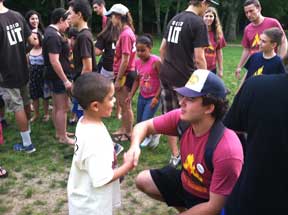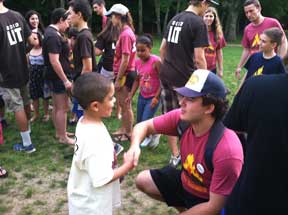 WEST GREENWICH, R.I. – July 25, 2013 – More than 1,000 Rhode Island children have type 1 diabetes, and many of them struggle to manage the disease while dealing with schoolmates who sometimes tease them about needing to check their blood sugars, count carbohydrates, and give themselves insulin at lunchtime.
WEST GREENWICH, R.I. – July 25, 2013 – More than 1,000 Rhode Island children have type 1 diabetes, and many of them struggle to manage the disease while dealing with schoolmates who sometimes tease them about needing to check their blood sugars, count carbohydrates, and give themselves insulin at lunchtime.
Camp Surefire, a one-week residential summer camp at the University of Rhode Island’s W. Alton Jones campus, has become the antidote to these challenges, providing dozens of children each year with lasting support and friendships while enabling their parents to have a week without having to worry about their child’s medical needs.
“Camp Surefire is often the first time that many kids get to meet a lot of other kids with diabetes, so they’re finally on an equal playing field with all the other kids,” said Dr. Gregory Fox, director of the camp. “A lot of kids don’t get the opportunity to go to other camps because most camps don’t have the medical staff to look after them. Just being able to go to camp is an important step.”
Many of the activities at Camp Surefire are common to typical summer camps, including swimming, games and campfires, but diabetes education is built into the schedule for all ages and frequent inspirational speakers talk about how to overcome the disease and succeed despite of it. And with the help of URI student counselors, everyone checks their blood sugar levels at every meal.
“For most of the staff, the night doesn’t stop when the kids go to bed,” said Fox, a pediatric endocrinologist at Pediatric Associates in East Providence. “That’s when the medical staff is at its highest activity level. Our medical staff is working around the clock, checking blood sugar levels on campers who are at risk. In my business, the worst case scenario is low blood sugar levels and a seizure in the night.”
Camp Surefire was established 15 years ago by the now-defunct Diabetes Foundation of Rhode Island to serve diabetic children aged 6 to 14. Fox and a group of supporters, including his wife, took over the camp five years ago, established a foundation to manage it, and moved it to the Alton Jones Campus.
“That’s when we started negotiations with URI to formalize an arrangement to use students as counselors,” he said. “We now take at least six pharmacy students and five nutrition students every year, and they’ve become an invaluable asset to our camp. They love it so much that many want to keep coming back again and again because the experience is so strong.”
Nick Leso, a URI pharmacy student from West Warwick, jumped at the opportunity to join the staff of counselors. His younger brother has diabetes, so Leso figured his background would be helpful.
“I thought I was going to be one of the more knowledgeable people there, but when there are so many kids and counselors who have been dealing with diabetes their whole lives, you learn so much every day,” Leso said. “As much as I know the kids look forward to camp, I love it just as much.”
Counselors work in teams of four to manage 8-12 campers at a time and spend most of their time keeping track of their blood sugar levels.
“By the end of camp, you can really see the signs of low blood sugar and notice when it’s starting to drop,” Leso said. “There are a lot of checks and balances that go into it.”
Leso said his experience as a camp counselor has convinced him of the importance of diabetes education for pharmacists.
“I want to continue to be immersed in diabetes education as long as I can,” he said. “I’ve heard that a lot of pharmacists don’t know much about diabetes, and I don’t want that to be me. I want to be someone these kids can turn to for the right answers.”
According to Fox, relocating to the Alton Jones Campus has allowed the camp to flourish.
“Most importantly, it has a professional kitchen staff that can adapt to the needs of the kids,” he said. “No longer do we have to devote our time to cooking. It allowed us to focus on strengthening the program, looking out for the kids, and not being distracted with other issues. Plus, the ropes course and team-building program allow us to foster leadership skills in the older kids, which helps the greater diabetes community.
“The Alton Jones Campus has helped make Camp Surefire a meaningful lifelong experience for our kids,” Fox added.
Pictured above
URI pharmacy student Bryan Vachon greets one of the campers at Camp Surefire, a summer camp for children with diabetes. (Photo by Alison Fox)

